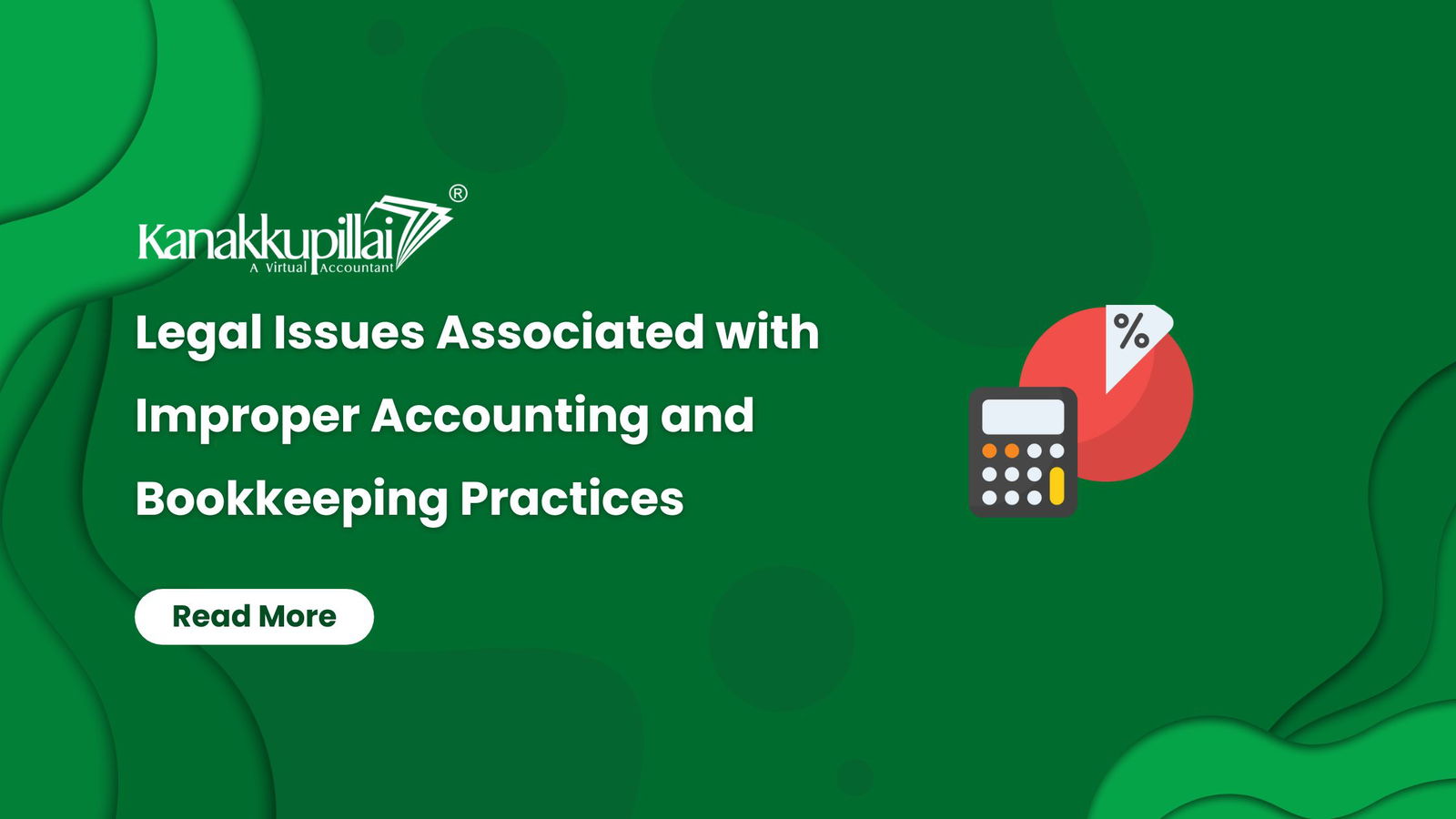Inaccurate financial records can have negative consequences for a corporation. If mistakes are made while reporting income or paying taxes, they might affect your credit score and the confidence of potential funders. This manual will help you comprehend the many accounting and bookkeeping errors that can lead to legal trouble.
Incorrect accounting and bookkeeping procedures raise what kinds of legal concerns?
The following legal issues may arise from improper accounting and bookkeeping:
1. False Bookkeeping
Businesses must prevent the myriad legal issues from sloppy accounting and bookkeeping. It may devastate your professional life and ability to perform successful business with reputable clients if you fail to keep correct financial records.
2. Revenue Issues
Inadequate bookkeeping might result in severe difficulties when filing taxes. Tax authorities may fine you, hurting your bottom line and making it harder to recruit new clients. Keeping meticulous records and strictly following tax requirements might help avoid such problems.
3. Money Fraud
It’s possible to set the stage for fraud and false claims with sloppy bookkeeping. Criminal charges and civil lawsuits might follow from intentionally falsifying financial data. Falsified financial statements damage your company’s reputation and erode investor trust, making it harder to secure funding and attract prospective investors,.This is one of the most pressing legal issues related to poor accounting and bookkeeping practices.
4. Agreement Violation
A contract violation may also occur if appropriate accounting procedures are not followed. There might be legal ramifications, reputational harm, and missed business opportunities if payments to suppliers and vendors are late.
5. Conformity with Employment and Labor Laws
Neglecting employee and labour regulations is another significant legal risk related to poor accounting and bookkeeping methods that can result in penalties and employee lawsuits.
6. Infringement of Intellectual Property
Another legal concern that can arise from sloppy bookkeeping and accounting is the unintentional or intended violation of intellectual property rights.
7. Competition and Antitrust Legislation
Antitrust investigations and legal proceedings may result from engaging in anti-competitive tactics or monopolistic behaviour. Competition law violations are bad for business since they may lead to costly fines and hurt your company’s reputation over time.
8. Disputes Involving Employees or Partners Under the Contract
Neglecting formal contracts with workers, contractors, or partners can lead to disagreements and legal proceedings, a key element in the legal concerns of poor accounting and bookkeeping methods. Costly legal fights might result from unclear agreements or misconceptions about obligations and compensation.
9. Mishandling of Trust Funds
Other typical sources of error include losing funds, making illegal withdrawals, or neglecting to record transactions. You could face penalties, suspension, or disbarment if you are careless with trust funds.
10. Mixing Up the Money
Unlike those in several other sectors, many organizations are subject to stringent accounting regulations relating to client trust accounts. It is a terrible idea to mix customer deposits with business money. To comply with regulations and act ethically, a company’s trust accounts for its clients must be kept entirely separate from the company’s general operating funds.
11. Confusion between Profit and Revenue
It is crucial to properly allocate cash upon receiving payment for services rendered. Most lawyers don’t know the difference between actual revenue and money that covers expenses. If this necessary step is skipped, incorrect financial records and compliance difficulties may develop, leading to legal trouble.
12. Errors in Data Entry
Client money management requires accuracy and adherence to several ethical requirements. No matter how small, repeated data entry can cause inefficiencies, erroneous data, billing issues, and even regulatory violations.
Consultation with an Expert Regarding Potentially Damaging Accounting and Bookkeeping Mistakes
The various problems raised clearly show that accounting requires certain abilities. If you want to keep your legal firm compliant and profitable, don’t hesitate to delegate tasks when the time comes.
Long-term success requires an awareness of and approach to the legal risks of accounting and bookkeeping errors. Basic accounting practices, adherence to rules, and legal assistance, where necessary, can help deal with these possible problems and protect your organization from expensive legal entanglements.
Conclusion
This blog post suggests close monitoring and proactive management to minimize legal issues related to erroneous accounting and bookkeeping. The company may fail if corporate leaders break employee and labor regulations, intellectual property rights, data protection and privacy laws, and environmental and antitrust laws.
Faqs
1. Accounting and bookkeeping: What is it?
While accounting and bookkeeping are related, they are distinct. Accounting documents summarise and report financial transactions. Systematic financial record-keeping is “bookkeeping”. Company financial health, performance, and liquidity can be gleaned from these statements. Bookkeeping records a company’s daily finances. This requires tracking all cash flows (sales, purchases, costs, etc.). Bookkeeping requires reconciling accounts and preparing financial reports.
2. How can I choose my company’s best accounting and bookkeeping program?
Consider these factors while choosing accounting and bookkeeping software for your business.
- Your company’s size
- What sort of business do you run
- Spending plan
- Essential Functions
- Advantageous Usability
- Reviewing accounting and bookkeeping software packages is also crucial before purchase.
3. What are the several kinds of accounting?
In the realm of commercial finances, accountants can specialize in a wide variety of subfields. Types of accounting that are particularly frequent include:
- Creating financial statements is the primary function of financial accounting.
- Management accounting gives company decision-makers financial data at the management level.
- Cost accounting examines the financial costs of producing or providing a product or service.
- Accounting for taxes: calculating and reporting one’s tax liability.





